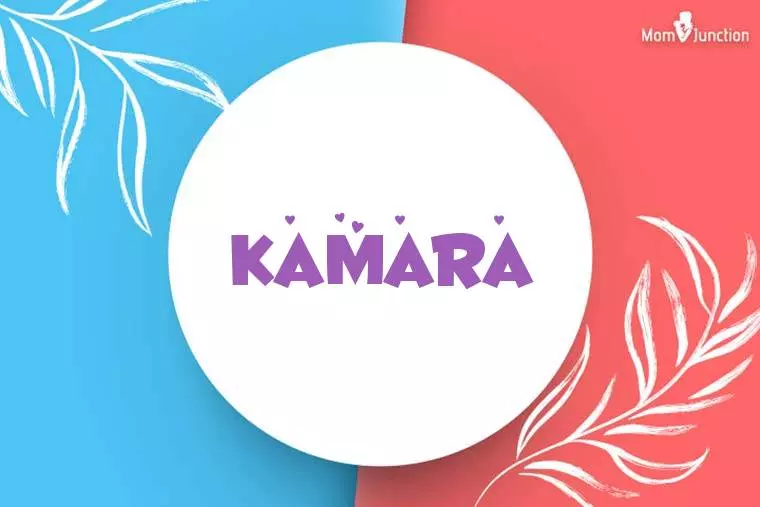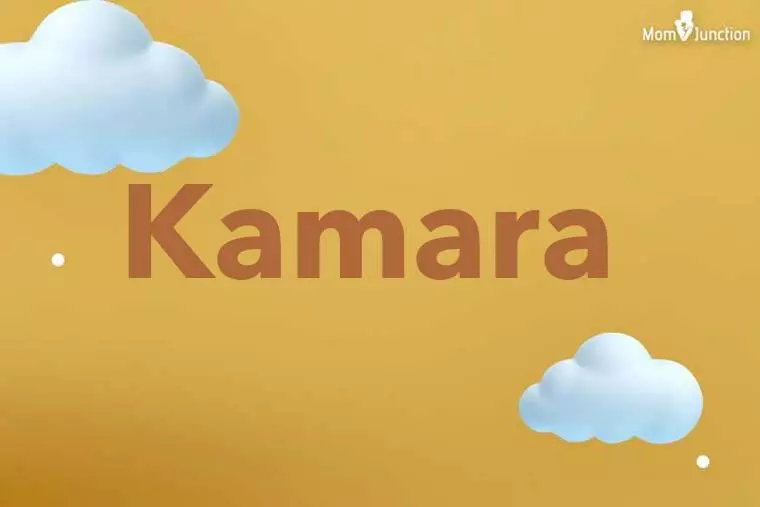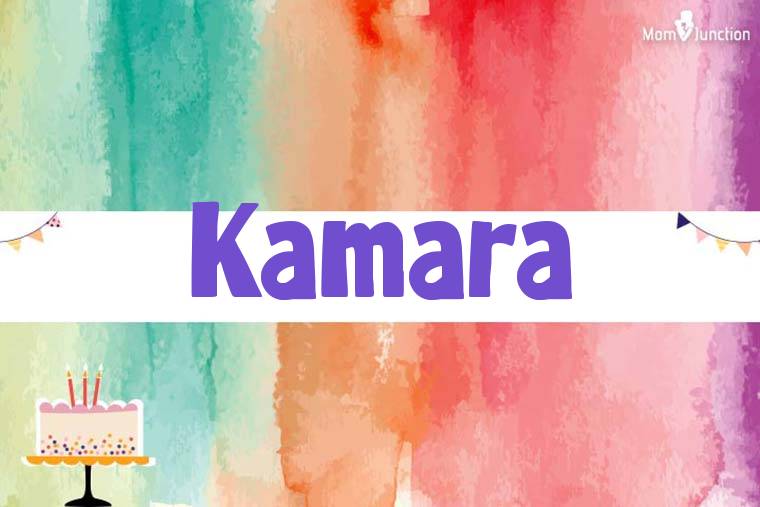What Ethnicity Is The Name Kamara? Uncovering Its Cultural Roots
Have you ever wondered about the stories names carry, the whispers of history and heritage they hold? So, a name is far more than just a label we use to identify someone. It is, in a way, a tiny piece of a person's cultural background, a hint at where their family journey began, or perhaps, a sign of traditions passed down through the ages. This is very true for names like Kamara, which spark curiosity about their origins and the communities they connect us to. Understanding a name’s background can feel a bit like piecing together a fascinating puzzle of human movement and shared identity across the globe.
People often feel a pull to know more about their own name or names they hear around them. It's a natural thing to want to connect with roots, to see how language and culture have shaped the very sounds we use every day. Names can tell us so much about ancient customs, migrations, and the ways different groups of people have interacted over time. Learning about the ethnicity behind a name like Kamara helps us appreciate the wide array of human experiences and the rich cultural fabric of our world, you know.
When we talk about the ethnicity of a name, we are really looking at its cultural home. Unlike race, which is based largely on physical attributes, your ethnicity is based on traditions, language, nationality or cultural heritage. Ethnicity is a cultural classification based on the language, traditions, and cultural origins of a group of people. It differs from race because race is a biological classification. An ethnicity or ethnic group is a group of people who identify with each other on the basis of perceived shared attributes that distinguish them from other groups. Ethnicity refers to markers acquired from the group with which one identifies. It is, you see, a complex concept that refers to a person’s identification with a specific group of people, based on one or more shared traits, which may include ancestry, culture. Ethnicity refers to shared cultural practices, perspectives, and distinctions that set apart one group of people from another. A large group of people with a shared culture, language, history, set of traditions, or something similar, or, as a matter of fact, a social group that strongly identifies with each other based on shared culture and history. Ethnicity, meanwhile, refers to a group of people who share a common history and culture. The meaning of ethnicity is ethnic quality or affiliation. A social group that shares a common and distinctive culture, religion, language, or the like. The United States has a racially and ethnically diverse population. At the federal level, race and ethnicity have been categorized separately. So, when we look at Kamara, we are asking about its cultural roots, its linguistic family, and the people who traditionally carry it.
Table of Contents
- Kamara: A Name with Deep West African Roots
- The Meaning Behind Kamara
- Geographical Spread and Diaspora
- Kamara and Cultural Identity
- How Names Travel and Change
- Ethnicity Versus Nationality
- Understanding the Broader Context of Names
- Frequently Asked Questions About the Name Kamara
Kamara: A Name with Deep West African Roots
The name Kamara, in its most common form, actually has a very strong connection to West Africa. It is widely recognized as a surname that comes from countries like Sierra Leone, Guinea, and Liberia. This region, you know, has a truly rich tapestry of cultures and languages, and Kamara is one of those names that speaks to this heritage. It is, perhaps, most often associated with the Manding group of peoples, which includes various subgroups such as the Mandinka, Susu, and Fula people, among others. These groups have a long and storied history in West Africa, marked by powerful empires, vibrant trade networks, and distinct social structures. The name itself, in a way, carries echoes of this historical depth and cultural richness.
When people ask, "What ethnicity is the name Kamara?", the answer points primarily to West African origins. This is not to say that every person named Kamara will have a direct, recent ancestor from this specific region, but the name's traditional home is certainly there. It is a name that has been carried through generations, reflecting the shared cultural practices and historical journeys of these West African communities. The sound and structure of the name itself are quite typical of names found in that part of the world, often linked to specific clans or family lineages. This connection makes it a truly interesting subject for anyone looking into the history of names.
The Meaning Behind Kamara
Like many names that have been around for a very long time, Kamara is thought to have meanings that relate to certain characteristics or roles within a community. While exact meanings can sometimes vary slightly between different dialects or specific family lines, a common interpretation suggests a link to strength or power. Some sources indicate that it might relate to "one who comes from a noble family" or "one who has power." This sort of meaning, you know, is quite typical for names that have ancient roots and were often given to mark status or qualities. It is a name that, in some respects, conveys a sense of importance or a significant position.
The specific meaning can also depend a little on the language from which it is derived. In various Manding languages, words that sound like Kamara often relate to concepts of authority or leadership. This makes sense, considering the historical context of the Manding empires where powerful families and leaders bore names that reflected their standing. So, when you hear the name Kamara, it is not just a sound; it is, basically, a word carrying a historical weight and a sense of dignity that has been preserved over many centuries. It truly gives us a glimpse into the values that were important to the people who first used this name.
Geographical Spread and Diaspora
While the heartland of the Kamara name is West Africa, its presence is felt much wider today. This spread is largely due to historical movements, including migration for economic opportunities, trade, and, sadly, the transatlantic slave trade. People carrying the name Kamara, or variations of it, have established communities in many parts of the world. You will find individuals and families with this name in the Americas, particularly in the United States and the Caribbean, and also in Europe, especially in countries that have historical ties to West Africa. This global presence is a testament to the resilience and movement of people over time.
In places like the United States, for instance, the name Kamara has become part of the diverse cultural fabric. It is, in a way, a name that bridges continents, connecting people to their ancestral lands while also becoming a part of new national identities. The spread of the name illustrates how human populations move, adapt, and create new homes while still holding onto aspects of their heritage. This is why when someone asks about the ethnicity of Kamara, the primary answer points to West Africa, even if the person bearing the name today lives thousands of miles away. It is a fascinating example of how culture travels and persists through generations, you know.
Kamara and Cultural Identity
For many who bear the name Kamara, it is a very strong link to their cultural identity. It connects them to a shared history, a common language, and a set of traditions that distinguish their group from others. This identification is not just about a surname; it often involves a deeper sense of belonging to a specific ethnic group, understanding their customs, and perhaps even speaking their language. It is a feeling of connection to a larger family, a broader community that shares similar cultural practices and perspectives. This bond is something that people often cherish, and it helps shape their sense of who they are in the world.
The name can also serve as a conversation starter, a way to share one's heritage with others. When someone asks about the name Kamara, it provides an opportunity to talk about West African cultures, their history, and the vibrant communities that exist today. It is, in some respects, a living piece of cultural heritage that continues to tell a story. This connection to a specific group, based on shared ancestry and culture, is a very important part of how people understand their place in the world. To learn more about cultural heritage on our site, you can check out some of our other articles.
How Names Travel and Change
Names, like people, do not stay in one place. They travel, they adapt, and sometimes, they change a little over time. The journey of a name like Kamara across continents is a good example of this. As people moved, sometimes their names were recorded differently in new places, perhaps due to differences in spelling conventions or pronunciation. Yet, the core sound and meaning often remained, acting as a thread connecting generations. This process of names moving and changing slightly is a natural part of human history and migration. It shows how language and identity are quite fluid, yet resilient.
The globalized world we live in today means names continue to spread and become familiar in new places. The name Kamara, for instance, might be found in communities where it was not traditionally present just a few decades ago. This ongoing movement means that while a name has a primary ethnic origin, its presence in various parts of the world reflects the rich and complex story of human interaction. It is a truly fascinating aspect of how we name ourselves and how those names reflect our shared journey. This continuous evolution of names is, you know, a very dynamic process.
Ethnicity Versus Nationality
It is important to remember the difference between ethnicity and nationality when we talk about names. Someone can be a citizen of one country, let's say, the United States, but their ethnicity, or the cultural group they identify with, might be West African. This is a common situation in countries with diverse populations. Your nationality is about the country you belong to, your citizenship, and the laws you live under. Your ethnicity, on the other hand, is about your cultural roots, your shared traditions, and the group you identify with based on language, history, or ancestry. As my text says, "Today, race refers to a group sharing some outward physical characteristics and some commonalities of culture and history. Ethnicity refers to markers acquired from the group with."
So, a person named Kamara could be American, British, French, or from any other country, yet their ethnic background, tied to the name, would likely point to West Africa. This distinction is very important for understanding identity in a world where people move freely and cultures blend. It helps us appreciate that identity has many layers, and a name often points to one of the deepest layers: our cultural heritage. This separation of concepts is, in a way, quite helpful for making sense of how we categorize ourselves and others.
Understanding the Broader Context of Names
Thinking about the ethnicity of a name like Kamara helps us appreciate the wider world of names and what they tell us. Every name has a story, a background that connects it to a particular time, place, and group of people. Learning about these stories helps us see the richness of human history and the ways different cultures have named their children. It also highlights how names can be a source of pride and connection for individuals and families. The study of names, or onomastics, is a fascinating field that truly sheds light on human societies and their movements.
The journey of a name from its origins to its current global presence is a powerful reminder of how interconnected we all are. Names are not just sounds; they are, in some respects, living historical documents, carrying traditions and memories across generations. So, the next time you hear a name that sparks your interest, remember that it might be an invitation to learn about a whole new world of culture and history. You can learn more about the meaning of names by visiting this page on our site, which, you know, might offer some additional insights.
Frequently Asked Questions About the Name Kamara
Is Kamara a common name in Africa?
Yes, Kamara is a very common surname in several West African countries. It is particularly prevalent in Sierra Leone, Guinea, and Liberia, where it is associated with various ethnic groups, especially those belonging to the Manding language family. It is, quite often, one of the most recognized family names in these regions, reflecting a deep historical presence.
Can people of different backgrounds have the name Kamara?
Absolutely. While the name Kamara has its primary ethnic roots in West Africa, people from many different backgrounds can carry this name today. This is due to global migration, intermarriage, and the natural spread of names over time. So, a person with the name Kamara might have a very diverse family history, even if the name itself points to a specific origin.
How can I find out the specific origin of my Kamara family name?
To find the specific origin of your own Kamara family name, you might need to do some genealogical research. This could involve looking at family records, birth certificates, and historical documents. Sometimes, you can trace family lines back to specific regions or even villages in West Africa. Websites specializing in ancestry and family history can be a very helpful starting point for this kind of personal discovery. For example, you might find useful information on a reputable genealogy site like FamilySearch.org, which, you know, offers extensive resources.
Exploring the ethnicity of a name like Kamara is a truly enriching experience. It connects us to a broader human story, showing how names are living links to our past and our shared cultural heritage. It reminds us that every name has a unique background, offering a glimpse into the diverse traditions and journeys of people around the world. Understanding these connections helps us appreciate the incredible variety of human experience and the ways we are all linked through history and culture. It is, in some respects, a way to celebrate the wonderful differences that make up our global community.

Explore Kamara Name Meaning, Origin, And History: Complete Guide: Meaning, Origin & Popularity

Explore Kamara Name Meaning, Origin, And History: Complete Guide: Meaning, Origin & Popularity

Explore Kamara Name Meaning, Origin, And History: Complete Guide: Meaning, Origin & Popularity